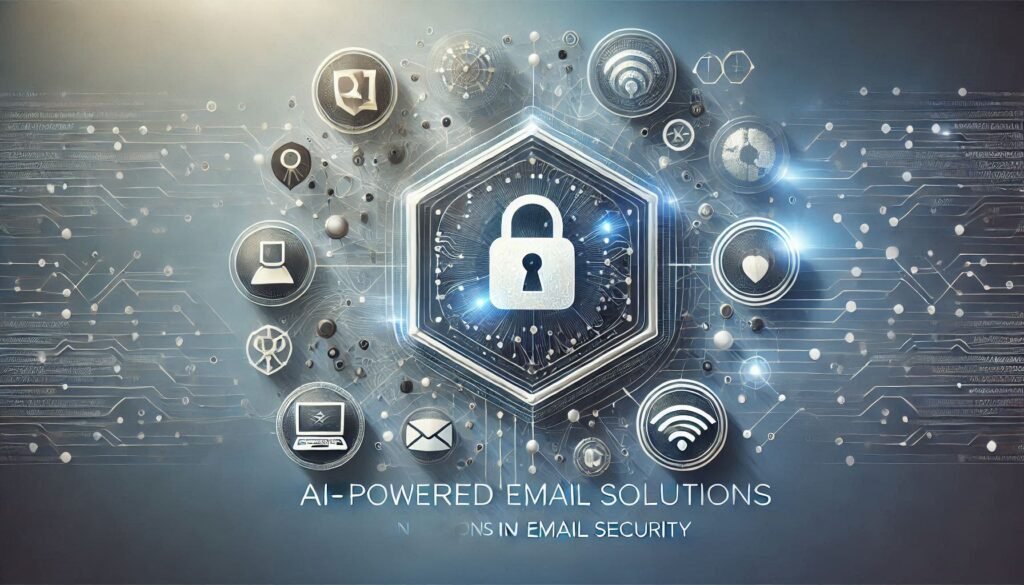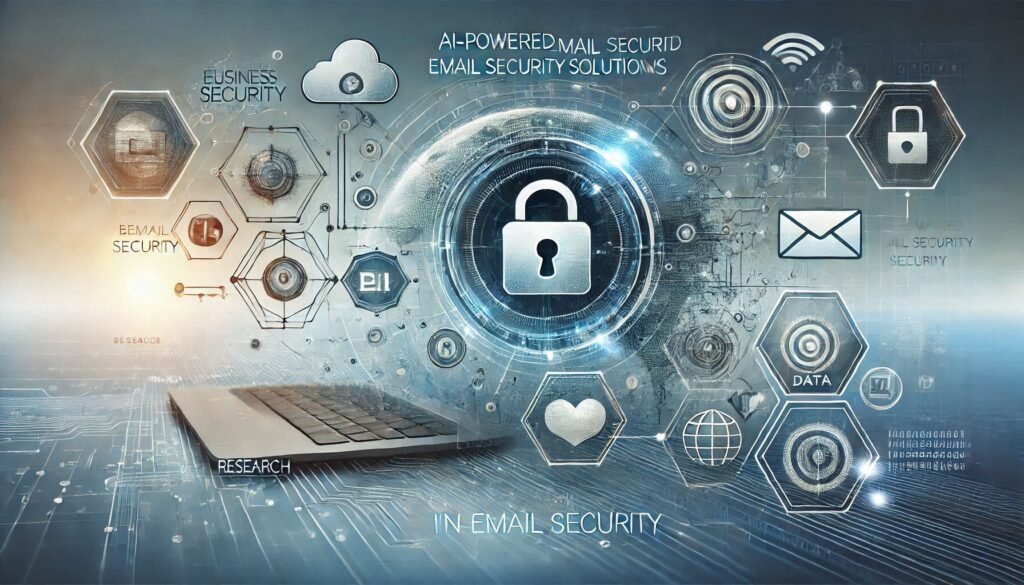AI-Powered Email Security: The Intelligent Defense Against Evolving Threats
Executive Summary
Email remains a cornerstone of modern communication, but it’s also a prime target for cyberattacks. Think of it as a bustling city – full of opportunities for connection and commerce, but also rife with potential dangers. Traditional email security measures, like basic firewalls and spam filters, are like the city walls, offering a first line of defense. But in today’s threat landscape, where cybercriminals are constantly devising new and sophisticated attacks, we need more than just walls. We need intelligent systems that can adapt and respond to evolving threats in real time.
That’s where AI-powered email security solutions come in. They act like vigilant guards, constantly patrolling the city, identifying suspicious activity, and neutralizing threats before they can cause harm. These solutions leverage the power of artificial intelligence (AI) to analyze vast amounts of data, detect patterns, and learn from experience, enabling them to identify and block even the most sophisticated attacks, such as spear phishing, zero-day exploits, and business email compromise (BEC).
This whitepaper explores the transformative impact of AI on email security, examining the key trends, challenges, and opportunities in this rapidly evolving landscape. We’ll delve into the significance of AI-powered solutions in safeguarding sensitive information, ensuring business continuity, and maintaining a secure digital environment.
Significance of AI-Powered Email Security Solutions
AI-powered email security solutions are revolutionizing the way organizations protect their digital communications. These solutions go beyond traditional rule-based systems, leveraging AI and machine learning (ML) algorithms to analyze vast amounts of data, identify patterns, and learn from experience. This enables them to detect and block sophisticated threats that can evade conventional security measures, such as spear phishing emails, zero-day exploits, and business email compromise (BEC) attacks.
By automating threat detection and response, AI-powered solutions reduce the burden on security teams, allowing them to focus on more strategic initiatives. Furthermore, these solutions enhance the accuracy and efficiency of email security, minimizing false positives and negatives, and ensuring that legitimate emails are delivered without disruption. In a world where cyber threats are constantly evolving, AI-powered email security solutions provide a dynamic and adaptive defense mechanism, safeguarding sensitive information and maintaining a secure digital environment.
Market Trends
Positive Trends:
- Increased Sophistication: AI algorithms are becoming more sophisticated, capable of detecting and responding to even the most subtle and complex threats.
- Integration with Existing Systems: AI-powered email security solutions are being integrated with other security tools and platforms, creating a more comprehensive and unified defense system.
- Cloud Adoption: Cloud-based AI-powered email security solutions are gaining popularity, offering scalability, flexibility, and cost-effectiveness.
- User Behavior Analysis: AI is being used to analyze user behavior and identify anomalies that may indicate a compromise, enabling proactive threat mitigation.

Adverse Trends:
- Data Dependency: AI models require large amounts of data for training and may be less effective in environments with limited data availability.
- Adversarial AI: Cybercriminals are exploring ways to use AI to their advantage, developing adversarial attacks that can bypass AI-powered defenses.
- Explainability and Trust: Understanding how AI algorithms make decisions can be challenging, which can hinder trust and adoption.
- Cost and Complexity: Implementing and managing AI-powered email security solutions can be complex and expensive, particularly for smaller organizations.
Market Segmentation
| Segment | Sub-segment | Description |
| Deployment Model | Cloud, On-premises, Hybrid | Deployment location of email security solutions, catering to different organizational needs and preferences. |
| Organization Size | Small and Medium Enterprises (SMEs), Large Enterprises | Categorization based on the size of the organization, recognizing the diverse requirements and resources of different-sized businesses. |
| Industry Vertical | Healthcare, BFSI, Government, IT & Telecom, Retail, Manufacturing, Others | Industry sectors utilizing email security solutions, highlighting the specific security and compliance needs of different verticals. |
| Solution | Secure Email Gateway (SEG), Email Encryption, Data Loss Prevention (DLP), Anti-Phishing, Anti-Malware, Archiving | Specific functionalities within email security solutions, addressing various aspects of email security such as data protection, threat prevention, compliance, and data management. |
| Technology | AI-Powered, Rule-Based | The underlying technology used in email security solutions, distinguishing between traditional rule-based systems and AI-powered solutions. |
Key Statistics
- According to Gartner, by 2025, AI will be used in 75% of organizations for HR functions, including talent acquisition and employee training.
- A study by Forrester found that 80% of security breaches involve privileged credentials, highlighting the need for advanced threat detection capabilities.
- The 2023 Verizon Data Breach Investigations Report found that phishing was present in 36% of data breaches, emphasizing the importance of email security.
Future Outlook
In the coming years, AI will play an increasingly critical role in email security. AI algorithms will become more sophisticated, capable of analyzing complex data patterns and identifying emerging threats with greater accuracy. We can expect to see increased integration of AI with other security technologies, such as threat intelligence platforms and security information and event management (SIEM) systems. Furthermore, AI will be used to automate a wider range of email security tasks, such as incident response and threat hunting, freeing up security teams to focus on strategic initiatives.

Problem Statement and Solution
Problem: Traditional email security solutions often rely on static rules and signatures, which are ineffective against zero-day exploits, polymorphic malware, and sophisticated phishing attacks that can bypass conventional defenses.
Solution: AI-powered email security solutions offer a dynamic and adaptive defense mechanism, leveraging machine learning algorithms to analyze vast amounts of data, identify patterns, and detect anomalies that may indicate a threat. These solutions can:
- Detect and block zero-day exploits: By analyzing email content and behavior, AI algorithms can identify malicious patterns and block attacks that have not been seen before.
- Identify and quarantine phishing emails: AI can analyze email content, sender reputation, and other factors to identify phishing attempts and prevent them from reaching users’ inboxes.
- Prevent business email compromise (BEC): By analyzing communication patterns and identifying anomalies, AI can detect and prevent BEC attacks, where attackers impersonate executives to initiate fraudulent transactions.
Evidence: Studies by security vendors and research organizations have shown that AI-powered email security solutions are significantly more effective than traditional solutions in detecting and preventing advanced threats.
Competitive Landscape
Key Players: Microsoft, Google, Proofpoint, Mimecast, Cisco, Fortinet
Key Products/Solutions:
- Microsoft Defender for Office 365
- Google Workspace Security
- Proofpoint Targeted Attack Protection
- Mimecast Email Security with Awareness Training
Competitive Strategies:
- Focus on developing AI-powered solutions that can detect and respond to advanced threats.
- Integration of AI capabilities with existing security platforms and tools.
- Strategic partnerships and acquisitions to expand market reach and enhance capabilities.
Key News:
- Recent product announcements and updates from leading vendors, highlighting new AI-powered features and capabilities.
- Industry collaborations and initiatives to promote AI adoption in email security.
- Investments and acquisitions in AI-focused security startups.
Innovation in AI-Powered Email Security
The email security landscape is witnessing significant innovation driven by AI. Recent developments include:
- Natural Language Processing (NLP): NLP is being used to analyze email content, understand the context and intent of messages, and identify phishing lures and other malicious content.
- Computer Vision: Computer vision is being used to analyze images and attachments in emails, detecting anomalies and identifying malicious payloads.
- Behavioral Analytics: AI is being used to analyze user behavior and identify deviations from normal patterns that may indicate a compromise.

Analyst Recommendations
- Adopt a layered approach to email security: Combine AI-powered solutions with other security measures, such as multi-factor authentication and security awareness training.
- Evaluate AI solutions carefully: Choose AI-powered email security solutions that are tailored to your organization’s specific needs and risk profile.
- Prioritize data privacy and security: Ensure that AI-powered solutions comply with data privacy regulations and do not compromise sensitive information.
- Invest in user education and training: Educate employees about email security threats and best practices, emphasizing the importance of vigilance and caution.
- Stay informed about emerging threats and AI capabilities: Keep abreast of the latest developments in the email security landscape and adapt your strategies accordingly.
Summary
AI-powered email security solutions are transforming the way organizations protect their digital communications. By leveraging the power of AI, these solutions provide a dynamic and adaptive defense mechanism against evolving threats. As cybercriminals become more sophisticated, AI will play an increasingly critical role in safeguarding sensitive information and maintaining a secure digital environment.
How is your organization leveraging AI to enhance its email security posture?


